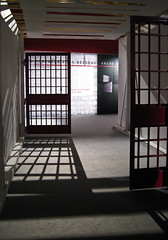 State and local juvenile justice programs are looking at some very deep cuts in their federally based funding. The Congressional rampage to cut federal “discretionary” spending is lurching their way with a proposal that should unsettle anyone who is concerned with the fate of our country’s youth.
State and local juvenile justice programs are looking at some very deep cuts in their federally based funding. The Congressional rampage to cut federal “discretionary” spending is lurching their way with a proposal that should unsettle anyone who is concerned with the fate of our country’s youth.
On the national level, Justice Department programs are funded by money appropriated by a single House committee, currently controlled by Republicans.
That committee has just submitted it’s financial proposals for the new fiscal year which starts on October first. In that proposal money dedicated to juvenile justice is reduces from $424 million in 2010 to $209 million, a slashing cut of more than fifty percent.
Ted Gest of the Juvenile Justice Information Exchange takes a closer look at the declining reosurces:
Federal aid for juvenile justice already had fallen more than 50 percent to its lowest level in more than a decade, says the Coalition for Juvenile Justice, which represents state advisory committees in Washington, D.C. The coalition is asking Congress for $80 million for “formula grants” that helps states comply with mandates in a key 1974 juvenile crime law, such as separating juvenile and adult defendants in jail and keeping minor offenders out of custody.
If you doubt the importance of keeping juveniles out of adult facilities, please look through the blog. It has been a constant refrain for us, as it is one of the biggest factors encouraging recidivism.
House appropriators, rather than adding funds for those purposes, would cut them to $33 million.
Continuing such cuts may raise questions about whether states will continue to abide by the federal requirements, with relatively little money at stake, as some states have done regarding the federal sex offender registration law.
This is really the big issue here. While progress has been being made in some states, a drastic reduction in federal funds could put those forward strides in jeopardy. As Gest noted above there is already a precedent for that sort of reaction, a fact that should give chills to any juvenile justice advocate.
Brace yourselves; the fight is about to get harder.
If you find yourself in the La Jolla area on Saturday, come out and meet Susan Madden Lankford, author of Born, Not Raised, at Warwicks. She will be holding a book signing from noon ’till 2 PM [details here].










